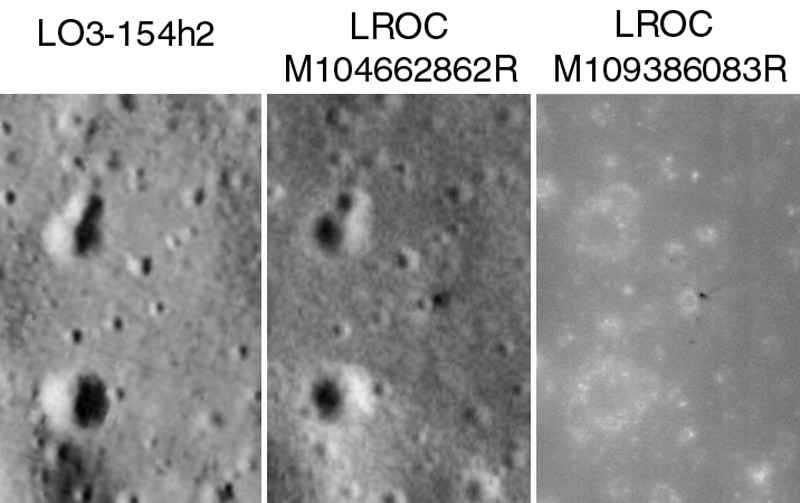Difference between revisions of "November 7, 2009"
| Line 11: | Line 11: | ||
<br /> | <br /> | ||
<strong>Related Links</strong><br /> | <strong>Related Links</strong><br /> | ||
| − | Rükl plate [https://the-moon.us/wiki/R%C3% | + | Rükl plate [https://the-moon.us/wiki/R%C3%BCkl_42 42]<br /> |
[http://www.planetary.org/blog/article/00002083/ Surveyor 3 and Apollo 12]<br /> | [http://www.planetary.org/blog/article/00002083/ Surveyor 3 and Apollo 12]<br /> | ||
<br /> | <br /> | ||
Latest revision as of 17:55, 13 October 2018
Dark Halo Rocket

composite image by Philip J. Stooke
The attached image shows three views of a small area just north of the Apollo 12 landing site. In fact it's only 200 m northeast of the Apollo 12 LM itself. These images cover an area approximately 100 m across from top to bottom. The one on the left is from Lunar Orbiter 3, the other two are from Lunar Reconnaissance Orbiter with low and high sun angles. A prominent small dark spot was first seen in the high sun LROC image. Comparison with the others shows it was visible in the low sun LROC image, but not the Lunar Orbiter image. Apparently it formed after the Lunar Orbiter image, taken early in 1967, but before the LROC images taken in the last few months. No Apollo 12 activities occurred at this location. The most likely explanation is that this dark spot marks the place where Surveyor 3's descent rocket fell. It was discarded as the Surveyor neared the lunar surface on 20 April 1967, and the spacecraft descended to a safe landing on its small vernier thrusters. All landed Surveyors dropped a descent rocket, but none were ever seen in surface images. In this case it appears to lie in a local depression hidden from view in Apollo 12 surface photography.
Philip J. Stooke
Related Links
Rükl plate 42
Surveyor 3 and Apollo 12
Yesterday's LPOD: New Data, New Answers, New Mysteries
Tomorrow's LPOD: Somewhere Over the Rainbow
COMMENTS?
Register, Log in, and join in the comments.



